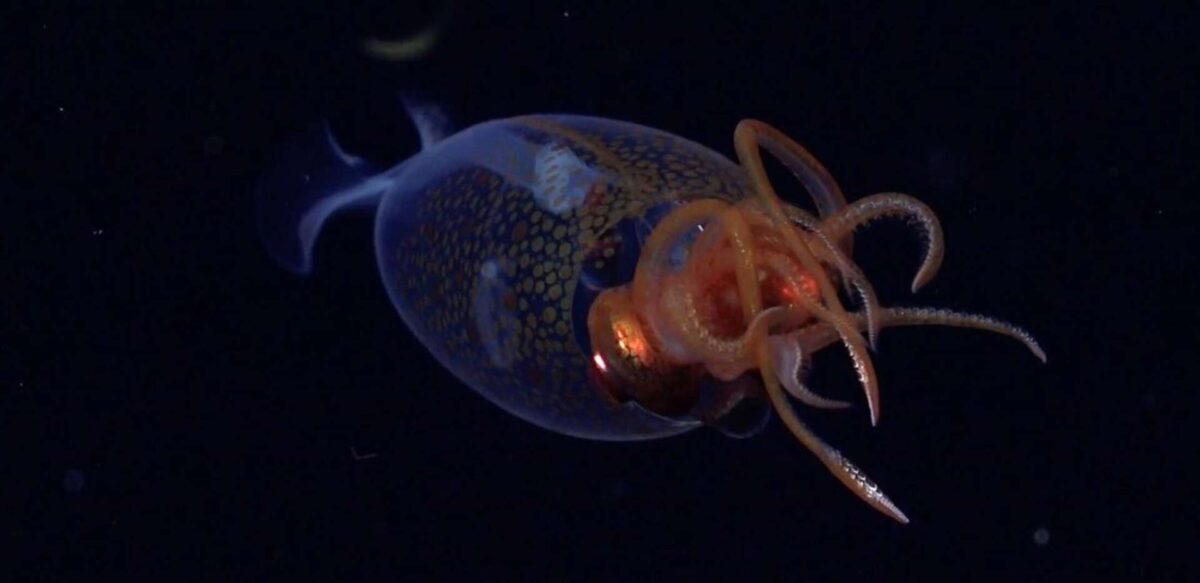Show table of content Hide table of content
In a groundbreaking discovery that has marine biologists worldwide buzzing with excitement, scientists have finally captured footage of one of the ocean’s most elusive creatures. The colossal squid (Mesonychoteuthis hamiltoni), long considered nearly impossible to document in its natural habitat, has been filmed alive for the first time in the deep ocean.
Mystery of the deep finally revealed
For over a century, the colossal squid remained more legend than scientific fact. These remarkable cephalopods inhabit the darkest regions of our oceans, between 500 and 2,000 meters below the surface, where light fades to nothing and pressure becomes crushing. Until recently, scientists could only study specimens that had washed ashore or been found in the stomachs of predators.
The historic footage was captured by an underwater robot deployed by the Schmidt Ocean Institute during an expedition near the South Sandwich Islands. The robot’s cameras documented a juvenile specimen approximately 30 centimeters long, swimming freely in its natural environment at a depth of over 600 meters. Though small, this juvenile offers a rare glimpse into the early life stages of a creature that can grow to tremendous proportions.
Adult colossal squids can reach lengths of about 10 meters and weigh up to 450 kilograms, making them among the largest invertebrates on Earth. Unlike their juvenile counterparts, which display an almost translucent body, adults develop opaque tissues as they mature. This remarkable transformation helps them adapt to their deep-sea environment, much like how certain turtle species adapt to their specific habitats with specialized features.
The footage provides valuable insights into the squid’s natural behavior, showing how it moves, navigates, and interacts with its environment—information previously unavailable to science. This discovery marks a pivotal moment in marine biology, transforming our understanding of deep-sea ecosystems.
Why these ocean giants remain so elusive
Capturing footage of colossal squids presents extraordinary challenges that have frustrated scientists for decades. These creatures inhabit some of the most inaccessible regions on our planet, where extreme conditions make exploration difficult even with advanced technology. The immense pressure, frigid temperatures, and complete darkness create a hostile environment for both humans and equipment.
Colossal squids have evolved behaviors that further contribute to their elusiveness. They move slowly to conserve energy in their food-scarce environment and often remain motionless for extended periods. When disturbed, they retreat deeper into the darkness, actively avoiding any sources of light—including the illumination necessary for filming them.
Science This strange red lake in Tanzania turns animals to ‘stone’.
Prior to this breakthrough, scientific knowledge about colossal squids came primarily from dead specimens. In 2007, New Zealand fishermen accidentally caught an adult specimen, providing researchers with valuable anatomical data but little insight into the creature’s living behaviors. Similarly, oceanographers occasionally find partial remains in fishing expeditions that yield unexpected discoveries beyond their intended targets.
The successful documentation required perfect timing, optimal conditions, and specialized equipment designed to minimize disturbance. The research team employed red lighting, which is less detectable to deep-sea creatures, and maintained significant distance to avoid frightening the subject.
Scientific implications of this unprecedented footage
This brief video sequence opens numerous avenues for research that were previously impossible. Scientists can now analyze the squid’s locomotion, hunting strategies, and environmental interactions. The footage reveals how the animal positions its tentacles, maneuvers through water currents, and responds to subtle environmental changes.
Understanding colossal squids becomes particularly important when considering their role in deep-sea food webs. As predators, they likely influence population dynamics of numerous species. As prey, particularly for sperm whales, they transfer energy between trophic levels in ways we’re only beginning to comprehend.
The Schmidt Ocean Institute’s expedition also documented other rare species in the South Sandwich Islands region, suggesting these remote waters harbor extraordinary biodiversity. This area, relatively unexplored compared to other marine environments, may contain numerous undiscovered species that could revolutionize our understanding of evolution and adaptation.
This breakthrough demonstrates the value of persistence in scientific exploration. Much like how dedicated efforts can lead to remarkable achievements in animal conservation, continued deep-sea research will likely yield additional discoveries about these mysterious creatures.
Protecting the unseen world beneath the waves
The documentation of the colossal squid in its natural habitat highlights the importance of preserving deep-sea ecosystems. These environments, despite their remoteness, face increasing threats from climate change, deep-sea mining, and pollution. Temperature fluctuations, even slight ones, can disrupt the delicate balance these creatures depend on.
Conservation efforts are complicated by our limited knowledge of deep-sea species. How can we protect what we barely understand? This footage provides compelling evidence of what we stand to lose if these habitats are damaged. It serves as a powerful reminder that the ocean’s greatest mysteries and treasures often lie in its least accessible regions.
Science 50 years later, a quantum mystery has finally been solved.
As technology advances, scientists hope to gather more extensive footage and data on colossal squids and other deep-sea inhabitants. Continued research will help establish more effective conservation strategies and potentially discover medical or technological applications inspired by these highly specialized organisms.
The colossal squid, once merely a creature of maritime legends, has now taken its rightful place in scientific documentation. This momentous first glimpse into its secret life reminds us that even in 2025, our planet still holds astonishing discoveries waiting to be revealed.


